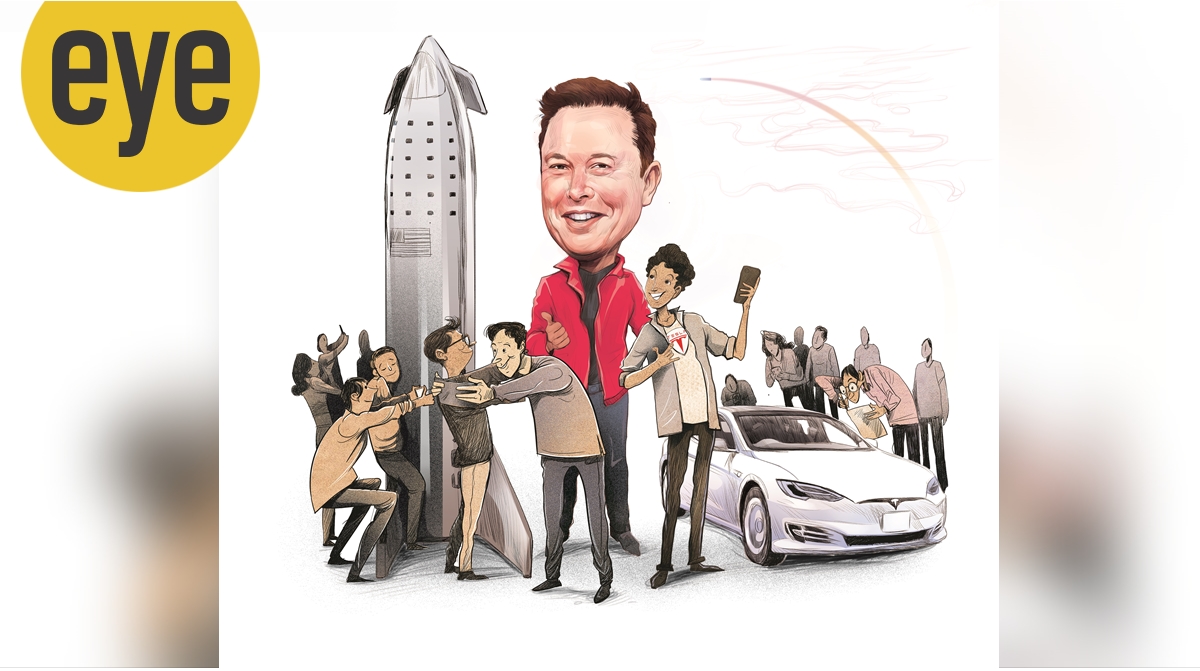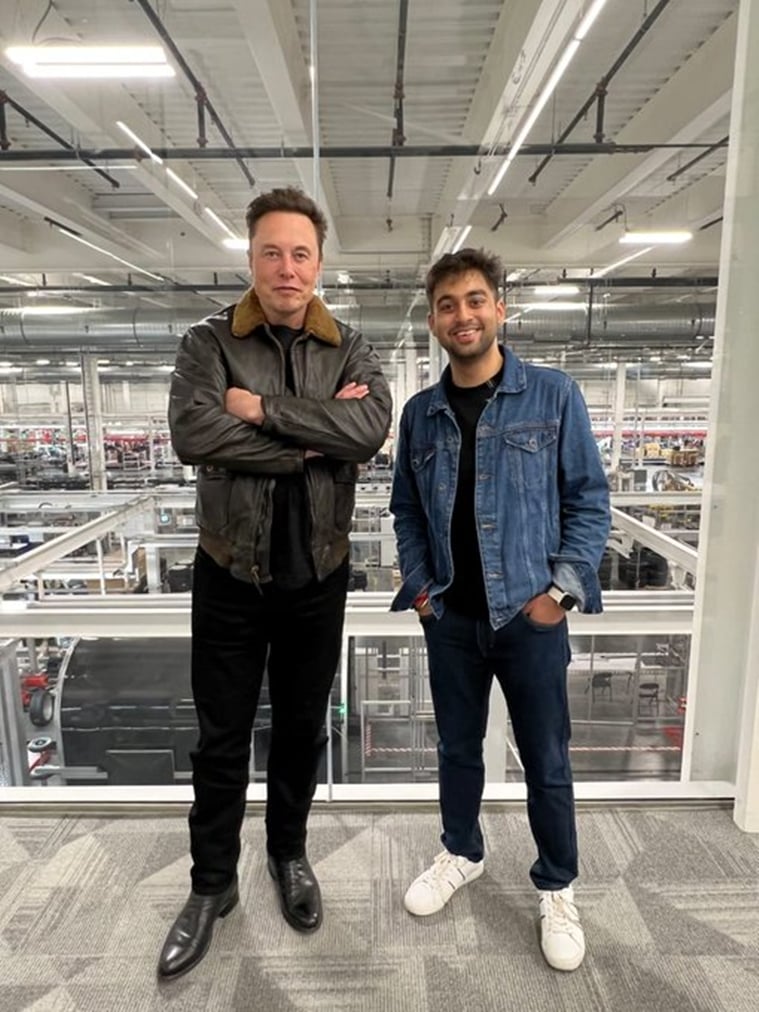 The most dedicated “Musketeer” community in India is on LinkedIn, with a member base of 23,579 followers (illustration: Suvajit Dey)
The most dedicated “Musketeer” community in India is on LinkedIn, with a member base of 23,579 followers (illustration: Suvajit Dey)IT MAY be a long shot but Gopi Gautham, a second-year engineering student at Chandigarh University, wants to invite billionaire Elon Musk as a speaker to his university’s Ted X event scheduled for this November. So far, he has made several attempts: first tweeting, asking Musk to “come to India where he has the largest number of fans”, then reaching out to his massive online followers in the hope that someone would put in a word to the world’s richest man.
So, why does he think Musk, his “inspiration”, would be a suitable guest? “Kuch na kuch to badlega hi agar woh aayenge (Something or the other will change if he comes to India)… there will be more job opportunities,” says Gautham. The 20-year-old who is trying to secure funding for an education-based Virtual Reality (VR) start-up and who sees Musk as an icon, says, “He works, falters, but does not stop working.”
Co-founder of fintech company Paypal, owner of Electronic Vehicle (EV) car manufacturing company Tesla, spacecraft manufacturing company SpaceX, founder of infrastructure construction enterprise The Boring Company and co-founder of Neura Link and Open AI. The world’s richest man with a strange, mercurial Twitter presence, who decided to buy the platform and back out of the deal. The one with oft-criticised, grand ambitions to go to Mars. These would be common ways to describe Musk. But for Gautham and other fans such as Aditya, a 23-year-old intern in a tech company in Bengaluru, he is a “brilliant innovator, revolutionising the face of technology and changing the world.”
The South-Africa born billionaire has acquired a legion of fans from across the world, not just for his products but also for himself. In India, his admirers are mostly male, ranging from students, entrepreneurs, fresh graduates, IT employees to professionals. They can be found on social media, online communities and discussion forums. The most dedicated “Musketeer” (as they call themselves) community is on LinkedIn. The founder of the 23,579-member forum — whose description reads “Is Elon Musk your Role Model? If yes, please join” — is Pune-based Atul Veer, director of engineering at Medly, a pharmaceutical company offering digital services.
Veer started the group in 2012, when he was working on an energy-analytics project. This was the time he realised the “importance of getting rid of fossil fuels at a large scale,” which led him to Musk who was “thinking about not just himself or his business but had a holistic and scalable approach. Though not many people believed him, the idea was to support him. We created a professional group, shared articles about him and it grew organically,” he says.
However, while these groups do exist, some are individual fans who have themselves amassed a following. Pranay Pathole — Musk’s “Twitter friend” — perhaps, his most famous Indian fan, is an example. With over a lakh followers, his feed is dedicated to Musk who “he happens to be in regular touch with.” It all started in 2018 when the Pune-based engineer tweeted at the SpaceX founder about wipers in a Tesla car. He received a reply and the conversations have continued ever since.
 Pranay Pathole at the Tesla Gigafactory in Texas in August (courtesy: Pranay Pathole)
Pranay Pathole at the Tesla Gigafactory in Texas in August (courtesy: Pranay Pathole) Musk’s appeal, says 23-year-old Pathole, can be traced to the fact that he does not follow corporate templates. “He is not your ideal CEO. Does not rely on his PR Guys”. (Due to a lawsuit, Musk cannot tweet about Tesla without consulting his company lawyers. His other tweets — what Pathole describes as part of his “meme lord” personality — are largely perceived to be his).
In August, when Pathole landed in the US to study data science at the University of Texas, he did what he had always said he would: meet Musk at Tesla’s manufacturing unit in Texas. He took to Twitter to say that he had “never seen such a humble and down-to-earth person.”
What makes young India look up to tech biggies as icons? India’s interest in software development is no secret, with over 5.2 million developers ready to enter the workforce by 2023. The Central government’s initiatives to support start-ups have only added to the innovation aura. Reports mention that more than 80 start-ups get recognised every day in the country, making it the highest rate in the world. Nearly 49 per cent of start-ups are from Tier II and Tier III cities alone.
It’s no surprise then that Atharva Madkar, 22, an IIT Guwahati graduate and currently a quantum computing student at the California Institute of Technology, calls himself a big fan. He recalls a time when he would watch Musk interviews religiously every day. “His intention aligns with mine,” says Madkar, who runs Forengers, an NGO that conducts plantation drives and undertakes cleaning in and around Pune. Other parts of Musk’s operations are equally fascinating for Madkar, who calls Tesla’s production capacity mind-blowing. He attributes Musk’s personality as a core part of his popularity: “He talks like a normal human being, it is not superficial… I cannot give a rational explanation for his fandom, but I like his approach.”
For Hyderabad-based Nishith Rao Koti, Tesla’s model of “envisioning the usage of lithium-ion batteries to power cars when nobody was doing so” was fascinating, particularly by someone “who did not have prior experience about it and was trying to make a difference in the entire industry.” And this is what draws him to the billionaire.
 Nishith Rao Koti (courtesy: Nishith Rao Koti)
Nishith Rao Koti (courtesy: Nishith Rao Koti) Koti, a 26-year-old budding entrepreneur who works at a pharmaceutical company, had pre-booked a Tesla when it announced operations in India in 2016. (Tesla registered an office in Bengaluru in 2021 but as of now will not be starting production because it is in a gridlock with the Central government over import duties. Musk’s satellite internet access company, Starlink, was also touted to come to India. It even started booking/rendering services but was reprimanded by the government for doing so without a licence.)
“Like most billionaires, Musk is a steadfast believer with a never-give-up attitude,” says Koti. According to him, Musk’s innate ability to work on Moonshot ideas (where he looks at radical solutions through disruptive technology) further motivates millions across the globe to aim for the stars.
Musk proved it in 2012 with his company SpaceX — started in 2002 — when it became the first private enterprise to send a craft to the International Space Station. This was the time the American space shuttle programme was going through a bit of a downward spiral, being largely dependent on Russian rockets.
However, Musk is not without his critics, especially with people finding him too self-absorbed and his community of followers turning into silos. A final-year Mechanical Engineering student from the Vellore Institute of Technology (VIT), who requested to stay anonymous, describes himself as an aero-astro maniac.
Calling himself a fan-turned-sceptic, he speaks of how Musk was a poster boy of the New Space movement. He says, “SpaceX and Musk usually took this angle: out with the old, essentially. Re-usability, rapid launch cadence, vertical integration, all these were the magical powers SpaceX possessed (supposedly), and which would breathe life into an ageing and slowing aerospace industry.”
As a 14-year-old aerospace nerd, he would play a space flight simulation video game called Kerbal Space Program, and pore over the world of the SpaceX fan forums, on Reddit primarily and on Nasa Space flight — an old school message board about all things aerospace. These forums certainly helped. “With a significant number of genuine employees of the aero industry consistently contributing with cool insights” this VIT student got a sneak peek into a world which was otherwise blocked to him as an outsider. The idea of Musk “openly tweeting about valves, tanks, pressure ratios, test schedules and costs of the launch business was extremely exciting” as opposed to the earlier “tight-lipped, suit-and-tie executives who would drip-feed PR speak once in a blue moon and maybe a memoir once every other decade about why certain things failed,” he says. As a student, he “kept track of SpaceX” engines at one point, and “Musk live tweeting about why engine #3939 exploded” was all wildly exciting for him.
 A poster of space simulation video game — Kerbal Space Program (Courtesy: kerbalspaceprogram.com)
A poster of space simulation video game — Kerbal Space Program (Courtesy: kerbalspaceprogram.com) What marked a departure from this adoration was the international Astronautical Congress in Guadalajara, Mexico in 2016, where Musk grandly outlined SpaceX’s plan to colonise Mars. “Now it was all about Elon’s plans… My hours following SpaceX dropped drastically. It was all Elon’s Rocket now, a departure from when the engineers and employees were discussed as the prime contributors. The community was now a total echo chamber,” he says.
At the moment, he is not noting down every component of what goes into making a SpaceX rocket, but he still feels like Musk “filled a space in a country which lacked genuine good science communication.”
Veer also echoes the thoughts. While he believes in Musk’s approach and ideas, he does not agree with the god-like cult following. “It has to be principle-centric and not person-centric,” he says.
Others, too, while fascinated by his advancements, view aspects of his personality with suspicion. Mihir Limaye, a 23-year-old student of MES Institute of Management & Career Courses, Pune, counts Musk’s quest for innovation behind his fandom, but acknowledges that “he has too much power and a crazy cult following.”
The billionaire has consistently come under flak for his statements and workplace practices. At 3.27 per cent, he had only paid small tax rates — in relation to the increase in his total wealth between 2014 and 2018 — according to a Propublica investigation in 2021. In 2020, Musk repeatedly underplayed the effects of COVID-19 in a bunch of tweets and also kept one of his factories open despite a local “shelter-in-place” order, before going on to halt production. His companies have faced allegations of sexual harassment and poor working conditions. Then came the confusion following his pulling out of the Twitter deal. As the announcement was made, the stock price of the site fell by 11 per cent in July. Twitter called Musk’s exit “a model of hypocrisy” in its lawsuit.
However, his followers were quick to point out on Twitter and elsewhere that this was just Musk’s “latest move in a long game to demand better business practices from Twitter.” Musk told the world that he wanted to buy the company in order to ensure that free speech was followed. He framed it as a moral project, in line with his larger-than-life persona. Despite these, some others, however, choose to focus on his work, rather than his grandstanding.
Most of Musk’s fans put down his popularity in large measures to the casual and friendly vibes he appears to send out. Shubham Arora, a gym trainer in Gurgaon, says, “He doesn’t show off, gives to charity, and shares his knowledge with the world. That is very important. Our Indian billionaires do not communicate and are not accessible. He is a good person in real life.” As a part of the crypto-mining community that waits with bated breath for Musk’s tweets on the subject — owing to his massive following, he has immense power to swing the markets — Arora follows his work closely.
Even as controversies swirl around Musk, for his fans he remains the man who made science cool. As Bengaluru-based Aditya sums it up: “Musk’s huge personality and non-apologetic, frank behaviour makes him a great influencer and not just an innovator or an engineer.”